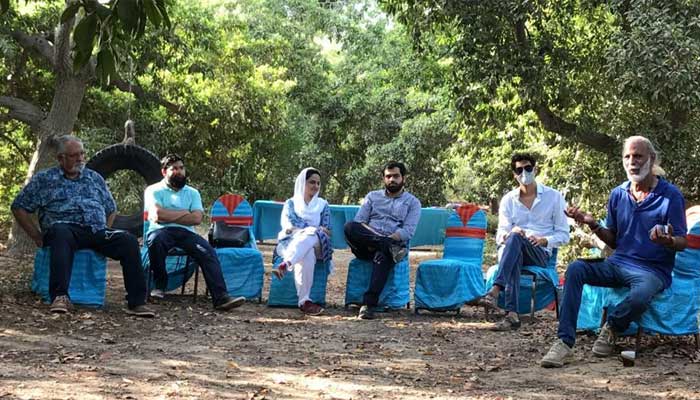Call for looking beyond knee-jerk solutions to environmental woes
There will be an alternative to plastic. But not soon. Not if you suggest replacing it with a Rs150 cotton bag, for that is not a sustainable option and the cost alone will deter people from shifting to it completely.
However, even though not soon, there will be a sustainable and safer detour. We are currently in a transition phase of finding an alternative to plastic with an understanding that the alternative has its own ramifications.
Horticulturist Tofiq Pasha made these remarks on Sunday during a discussion that was titled ‘World Environment Day — The Decade of Ecosystem Restoration’ and held at his farmhouse in Malir.
He explained how there’s an endemic palm tree in Balochistan, which is native as well. “It doesn’t exist anywhere in the world,” he said, adding that its dates are edible. He said the palm tree has a very large family, and this one is called Mazari Palm, which exists in Turbat and areas further from Lasbela in Balochistan. Its leaves in Sindhi are called Pun, he added.
Pasha recalled receiving a kilogramme of dates beautifully wrapped in its own leaves. “I have had a basket made of its leaves,” he said, pointing out that if its leaves were to become an alternative to plastic, people would chop all of them and this tree would become scarce.
“One has to look at the long-term and sustainable solution,” he stressed. In times to come, he predicted, more and more alternatives to plastic would be invented. However, he said, we are still wasting our own resources in the name of alternatives. He gave examples that instead of plastic, we use paper bags, but it costs a tree’s life, so we start using a cloth bag.
He laughed, saying that cloth bags are made of cotton, and shared how an enormous amount of water is consumed to produce cotton, and the amount of fertilisers and pesticides it uses. “It’s as bad as fossil fuel,” he said, adding that there would be other alternatives, “but this will remain a transition phase”.
Moving forward, he explained how Nehr-e-Khayyam seemed to be slipping out of our fingers. “It’s a storm water drain, also part of our creek,” he said, adding that during high tide the water comes in and during low tide it recedes.
Pasha said he’s afraid that one may end up paying to visit Nehr-e-Khayyam because private parties are involved in its rehabilitation. “God didn’t make sewerage drains. How dare we turn our rivers and lakes into sewers?”
Speaking about floods in Karachi, specifically in the upmarket DHA neighbourhood, where the monsoon rains had wreaked havoc last year, he said now there is a global crisis, not global warming.
During the discussion an environmentalist pointed out how the sea is reclaiming its land that the authorities had illegally claimed from it, and now we are paying the price. Environmentalist Maleeha Habib said it’s the most vulnerable people in society that suffer the most due to an environmental crisis. If one wants to resolve and help the most vulnerable, she said they will have to feel their pain personally.
-
 Queen Elizabeth Tied To Andrew's Sexual Abuse Case Settlement: Report
Queen Elizabeth Tied To Andrew's Sexual Abuse Case Settlement: Report -
 Mark Ruffalo Urges Fans To Boycott Top AI Company Boycott
Mark Ruffalo Urges Fans To Boycott Top AI Company Boycott -
 Prince William Joins Esports Battle In Saudi Arabia
Prince William Joins Esports Battle In Saudi Arabia -
 Princess Beatrice, Eugenie Are Being Ripped Apart: ‘Their Relationship Is Fully Fractured’
Princess Beatrice, Eugenie Are Being Ripped Apart: ‘Their Relationship Is Fully Fractured’ -
 Arden Cho Shares Update On Search For ‘perfect’ Wedding Dress Ahead Of Italy Ceremony
Arden Cho Shares Update On Search For ‘perfect’ Wedding Dress Ahead Of Italy Ceremony -
 Ariana Madix Goes Unfiltered About Dating Life
Ariana Madix Goes Unfiltered About Dating Life -
 Prince William Closes Saudi Arabia Visit With Rare Desert Shot
Prince William Closes Saudi Arabia Visit With Rare Desert Shot -
 'King Charles Acts Fast Or Face Existential Crisis' Over Andrew Scandal
'King Charles Acts Fast Or Face Existential Crisis' Over Andrew Scandal -
 Brooklyn Beckham Charging Nearly £300 In Ticket Cost For Burger Festival
Brooklyn Beckham Charging Nearly £300 In Ticket Cost For Burger Festival -
 Prince William Makes Unexpected Stop At Local Market In Saudi Arabia
Prince William Makes Unexpected Stop At Local Market In Saudi Arabia -
 Zayn Malik Shares Important Update About His Love Life
Zayn Malik Shares Important Update About His Love Life -
 James Van Der Beek's Celebrity Pals Pen Touching Tribute After His Death
James Van Der Beek's Celebrity Pals Pen Touching Tribute After His Death -
 Kate Middleton, William Are Holding Onto Their Hats As Worse Gets Threatened: Behind The Veil Of Shame
Kate Middleton, William Are Holding Onto Their Hats As Worse Gets Threatened: Behind The Veil Of Shame -
 British Soap Awards Scrapped Again As ITV Confirms 2026 Hiatus
British Soap Awards Scrapped Again As ITV Confirms 2026 Hiatus -
 Climate Nearing Dangerous Tipping Points, Study Shows
Climate Nearing Dangerous Tipping Points, Study Shows -
 James Van Der Beek, 'Dawson's Creek' Star, Dies At 48
James Van Der Beek, 'Dawson's Creek' Star, Dies At 48




